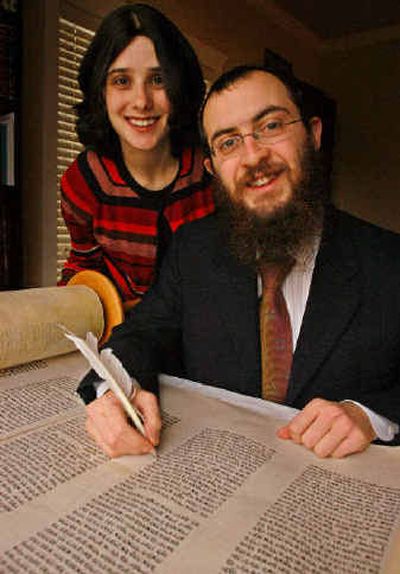Orthodox

BOISE – Idaho may be one of the last frontiers for American Orthodox Jews.
It’s nearly impossible to keep kosher without shipping food from out-of-state, there is only one Jewish synagogue here in the state’s largest city, and the nearest mikvah – a ceremonial immersion pool central to traditional Jewish family life – is hours away in Salt Lake City.
But all that could change now that Chabad Lubavitch is in town.
Rabbi Mendel Lifshitz, 28, his wife Esther, 23, and their two young sons are part of Chabad, a Hasidic organization that sends its emissaries around the world to persuade Jews to become more observant.
The Lifshitzes came to Boise to open a Chabad center, where classes, religious services and social gatherings are held.
“We’re here to service a Jewish community. If I help even one person grow, then that’s enough,” said Mendel Lifshitz, whose home currently doubles as the center.
Until just a few months ago, Idaho was one of only six states without a permanent Chabad center. The last one established in the United States was in Utah nearly 12 years ago, Lifshitz said. The only states remaining without permanent Chabad centers are Montana, the Dakotas, Wyoming and Mississippi, he said.
In Idaho, where the majority of people are either Mormon or Roman Catholic, the rabbi, with his long beard and yarmulke, is easy to spot. His wife jokes that he is “a walking advertisement for Judaism.”
“Being here gives me the opportunity to preach without even teaching, as a living example of tolerance and diversity,” Mendel Lifshitz said. “It’s an incredible experience for us.”
The exact number of Jews in Idaho is unknown, since the U.S. Census does not ask about religion. But Boise boasts the oldest continuously operating synagogue west of the Mississippi: Ahavath Beth Israel, built in 1895.
The congregation, made up mostly of Reform and Conservative Jews, is very active.
And the state was the first in the nation to elect a Jewish governor, when Moses Alexander won the popular vote in 1914.
However, Rabbi Lifshitz, who estimates that 2,000 or so Jews live in Idaho, believes the overwhelming majority are not affiliated with a branch of Judaism.
“Jews looking for a very involved community would probably not have settled in Idaho,” Lifshitz said. “But there are quite a few Jews in our community, and they feel accepted here.
“Part of fighting anti-Semitism is Jewish people feeling comfortable and seeing their own culture being represented. That’s what we do.”
The Lifshitzes are already trying to make their beliefs easier to carry out in daily life.
Mendel Lifshitz is lobbying to make more kosher food available at local grocery stores. In the meantime, he and his wife have started a kosher co-op, allowing residents to buy the kosher meats the rabbi and his family stock in the freezer in their garage.
Esther Lifshitz leads a Mommy and Me program and a women’s group in the home focusing on Jewish issues. The couple hope to eventually start a Jewish preschool.
Despite Idaho’s mostly homogenous population and a hard-to-shake image as a haven for racist groups, the Lifshitzes were not worried about coming here from New York.
“It’s an unfortunate stereotype that’s out there,” Mendel Lifshitz said. “I have family in New York that said, ‘How could you live in Idaho?’
“But the fact of the matter is there are larger anti-Semitic groups headquartered just four hours away from New York. Here they’re basically gone, and even if a few linger in Northern Idaho, that’s still an eight-hour drive.”
He does encounter some ignorance. People often try to shake his hand – which is fine, except that many Orthodox Jews do not touch members of the opposite sex unless they are family.
“No offense – it’s nothing personal,” he says to those who try. “There’s your first lesson in rabbinical etiquette.”
Neither is Lifshitz offended by questions about his appearance or religion.
“If people don’t know much about Judaism, it’s our own fault,” he said. “What I would do is encourage them to get involved.
“Not become Jews – we don’t believe in proselytizing – but to welcome them into the community.”
Idaho may be a late bloomer when it comes to Jewish observance, he said, but that’s OK.
“Sometimes the late bloomers are the best. Here we’re able to build upon all the experiences of Jews in America,” he said. “Every candle, every flame counts. Even those in Idaho.”